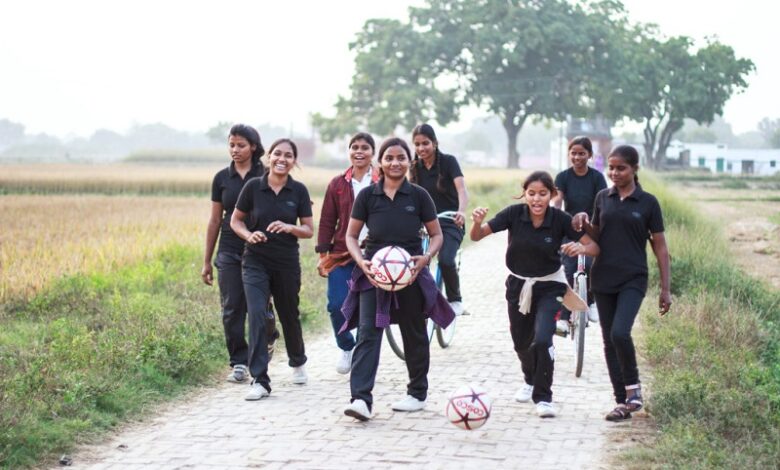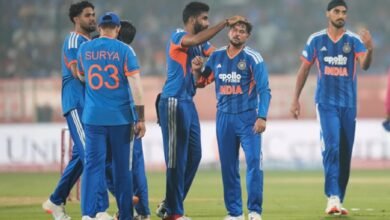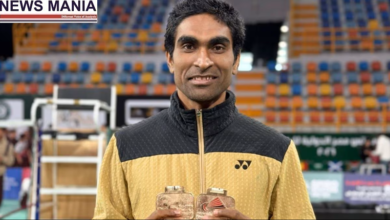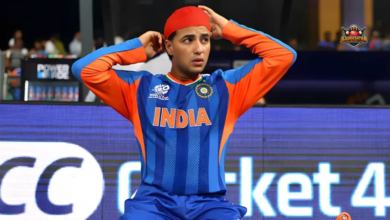Empowering Girls Through Sport: The Inspiring Journey of India’s ToofaanGames

In the wake of the Women’s World Cup, where sportswomen continue to bask in the spotlight, an inspiring homegrown initiative is leading the way towards a brighter future for young girls across India through the power of sports. For the past four years, the Toofaan Games, organized by the Naandi Foundation, an offshoot of the renowned Project Nanhi Kali, have been making a remarkable impact on the lives of underprivileged girls aged 6-15 from nine different states. This initiative has not only thrived but also serves as a testament to the significance of women coaches in the world of sports.
At first glance, the Toofaan Games may not seem like the most significant sporting event, especially when compared to the grandeur of events like the 2024 Paris Olympics, which is set to feature a staggering 10,500 athletes. However, what sets this initiative apart is its grassroots nature and the absence of conventional sports officials. Instead, it is led and managed by rural women who have taken it upon themselves to transform the lives of these young girls.
The story of the Toofaan Games is not just about sports; it’s also a narrative of local leadership and empowerment. It provides a resounding answer to a question that has reverberated through the global sports community: Why do women coaches matter?
The genesis of this remarkable journey can be traced back to a chance meeting between Rohini Mukherjee, Vice President at the Naandi Foundation, and Lisa Murawsky, a seasoned sports veteran from Brussels, in 2018. Murawsky’s simple question, “Have you ever thought of adding a sports component to the work you do?” sparked a transformational collaboration that led to the birth of the ‘Sports for Life’ program.
Their mission was to create a sports program that catered to the unique needs of first-generation learners enrolled in the Nanhi Kali program, supervised by 6,500 tutors across villages. These girls faced challenges such as a lack of proper sports equipment, limited access to facilities, and concerns about nutrition. The program had to be straightforward and easily executable by their tutors, who would later be renamed sports allies, across India.
In 2019, the Toofaan Games came to life with just four events and four age groups, each named after accomplished sportswomen like Swapna Barman, Hima Das, MirabaiChanu, and PV Sindhu. These events tested various skills, from speed and endurance to agility and strength. It was a humble beginning, but it had a profound impact.
Murawsky, initially expecting to focus on technical aspects and convincing women of the importance of sports, was pleasantly surprised. The women who tutored the girls recognized the transformational power of sports on self-esteem and confidence. The games were a resounding success, but it was the sports allies who truly shone. They embraced technology, communicating with Murawsky and Mukherjee through videos and an app, sharing their successes and creative solutions, like crafting goalposts from bathroom pipes.
Even during the pandemic, when conventional sports were on hold, the Toofaan Games persevered. Children innovated with whatever items were available at home, using bottles, buckets, slippers, and brooms to complete exercises prescribed by Murawsky. A sports conference allowed the women to share the most rewarding and challenging aspects of the program. The children reveled in the newfound opportunities, while the toughest obstacle was often parental concern over injuries or changes in appearance due to outdoor activities.
One pivotal moment occurred when VishakhaBhale Vyas, a program quality manager at Naandi, oversaw 30,000 girls who returned to school and completed her LLB degree. In Gujarat’s Jambusar, girls initially played sports in hijabs, ghagras, and dupattas until they realized these attire choices were impractical for running. Bhale Vyas stumbled upon a grassroots government sports program, organized a football team of 20 girls, and participated herself as a manager. The team, lacking proper football gear, used their black school shoes with straps as substitutes. This adventure, though challenging, ignited a passion for football in the girls.
Realizing the potential, Bhale Vyas called Mukherjee and requested a football coach. This marked a turning point as Murawsky and Mukherjee began to focus on football more seriously. They organized a football camp in Jambusar, which gained traction when a local headmaster installed floodlights on the school playground. Word spread, and more villages expressed interest in football.
Recognizing the need for women coaches, the All India Football Federation stepped in to train women as basic E level certified coaches. The ‘Game Changer—Women Coaches-in-Training’ program, launched in Jambusar in 2021, has now produced 130 E level certified coaches and seven advanced B level certified coaches. These coaches travel across the country, teaching girls the art of football. One coach, Bhavika, transitioned from training girls in saris and ghoonghats to wearing shorts herself, while her mother-in-law looked after her children.
This transformational experience has not only impacted the young girls but also the sports allies who witness women like them, who didn’t grow up with sports, now coaching and inspiring the next generation. It’s a motivational cycle that continues to fuel the program’s growth.
In Jambusar, VishakhaBhale Vyas reflects on the profound changes that have occurred. The days of requesting parents to allow their daughters to play are behind her. The football team has achieved numerous victories, and the village panchayat warmly welcomes them home after every triumph. The demand for football has surged, with league matches becoming a weekend tradition at the khokho ground.
The success of the Toofaan Games and the emergence of women coaches in sports send a powerful message: It’s not just about getting more women to coach in sports; it’s about providing women with the opportunity to coach and, in turn, empowering girls to reach for their dreams. In this journey, the Toofaan Games stand as a beacon of hope, demonstrating that when women come together to uplift the next generation, they create a storm of positive change that can transform lives and communities.
News Mania Desk / Agnibeena Ghosh 7th September 2023






